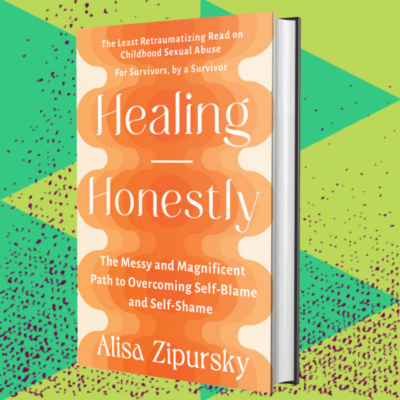This story contains descriptions of PTSD symptoms, discussion of child sexual abuse, and the effects of trauma.
PTSD and trauma affect our sexual relationships, so how about we actually talk about it! Openly! Publicly! Loudly! With Humor! And Love!
I have been getting a lot of requests from fellow survivors and the people who love them to talk about the specific ways that being a sexual violence survivor and having PTSD affect sexual relationships. There’s no way around it, my identity as a survivor directly affects my 3-year-long relationship with my boyfriend more days than not (for example, as I write this I am at a coffee shop that he escorted me to today when my anxiety was crippling my inability to leave my house alone). Amidst being young and in love and dealing with questions about building our future together, our changing sex lives, and a constant desire to eat a lot of Thai noodles and watch 30 Rock together, we also deal with my mental illness.
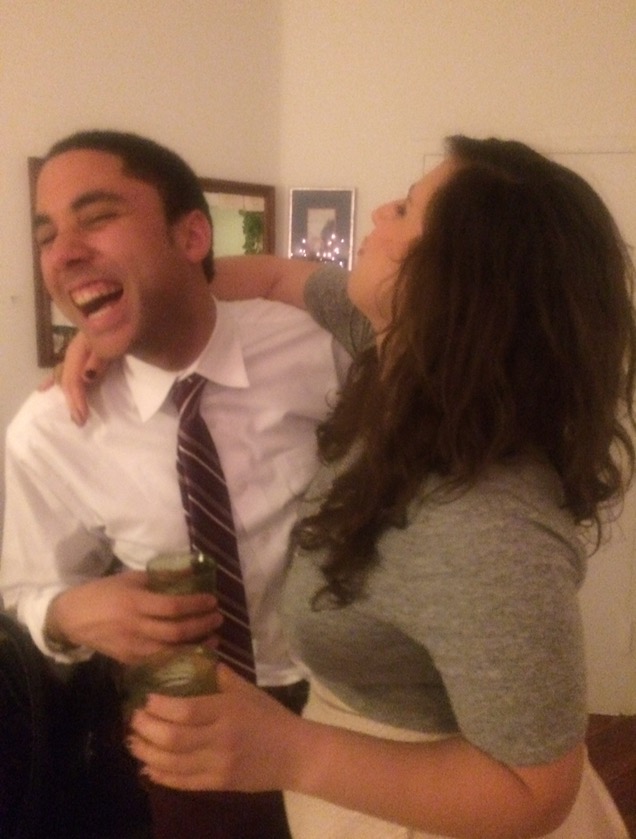
There’s no one better than my boyfriend to describe what it’s like from his perspective, so I conducted a written interview with him (edited down for length), which is below. Spoiler alert: he’s a really good writer, and also a keeper. If you want to share with me about how survivorship is affecting your relationships I am here, as always, at alisa(dot)zipursky(at)gmail(dot)com. I also need to acknowledge the article On Marrying a Survivor of Childhood Sex Abuse by Shonna Milliken Humphrey in The Atlantic four years ago that remains an enormous inspiration for me to speak honestly about the complexity of intimacy with a survivor.
My interview with my brilliant and sexy boyfriend:
Alisa: Hello dear sir, could you tell me a little about yourself?
Charlie: Of course, madam. Well my name is Charlie, a 29-year-old young man hailing from the great Garden State and favorite punching bag of the East Coast, New Jersey. I’m from Hackensack, a melting pot of cultures and ethnicities that is a perfect representation of my mixed background as the product of a white mother and black father. This upbringing, along with very loving parents, a younger sister, and wise, nurturing grandmother, have shaped my worldview in embracing diversity; since day one I’ve been raised to respect, accept and care for people for who they are, regardless of where they come from.
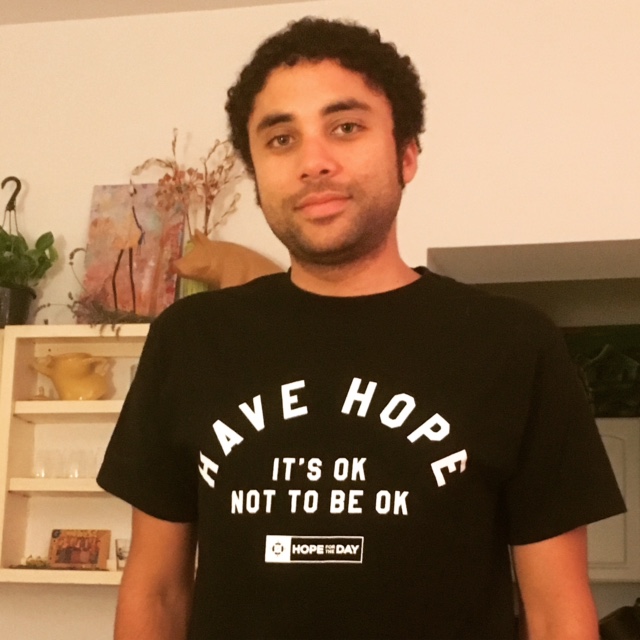
Learning the truth about my trauma:
Alisa: If I remember correctly, there wasn’t one single moment where you learned about me being a sexual abuse survivor, but it was gradually over time. Is that true?
Charlie: The process of discovering that you were a sexual abuse survivor was gradual and came out over time as you grew more comfortable and in love with me. There was one time when we were having sex that you had to stop and started crying. You told me that your biological father had been abusive, but only mentioned it as emotionally manipulative and creepy, that he had often talked to you in ways that a husband would talk to a wife about repairing your relationship. You mentioned the myriad ways that he often used guilt to elicit emotion from you.

You cried while explaining this to me and all I could feel was rage that someone could make a person as great as you feel as small and weak as he did. I believe it was laterwhen you fully opened up to me that it was sexual abuse and not just emotional.
Alisa: Were you surprised?
Charlie: I was surprised because often, in the media and pop culture, women that have been abused are portrayed as broken in some form or another, or show some sort of weakness. I had never seen that in you. You were strong, extroverted, fearless and well-adjusted, it was difficult to understand that you were hiding this pain.

Alisa: Were you afraid?
Charlie: I wasn’t afraid, but I was enraged. My blood boiled with the fact that some sad, insignificant man could have done something so terrible to his own daughter that she would carry for the rest of her life.
But I would be lying if I said it wasn’t intimidating because you were someone that I spent a lot of time with and with whom I was the most intimate. I am a caring and understanding person, and was committed to being by your side, but I knew it would require a lot of me, sometimes at the cost of dealing with my own problems, to be fully supportive of you and have to watch you go through the emotional roller coaster of triggers, whether they were part of random occurrences or pivotal life moments.
Sex with a survivor (alternatively titled: Bang City):
Alisa: How unsexy is it when I have to stop us mid-sex because I see my dad’s face? Isn’t it the worst? It’s the worst for me.
Charlie: Haha, it does suck. And while I know it’s about how the intimacy of the act triggers a response in your brain that brings you back to a moment of pain and vulnerability, it did worry me the first time. I couldn’t help but wonder if I had done something to trigger that response. Had I made a certain face or movement that was bad, was that face something I could control or be aware of in the future? And then obviously the thought would creep in about whether having sex would always make you feel this way, and if so, how could we be intimate without this happening.
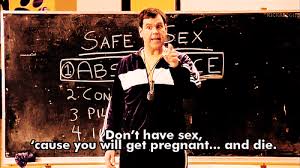
Alisa: So I often go months without being able to have sex because my PTSD is shitty and I’m so afraid I’ll be triggered during sex. And then I’ll announce to you that I think we are never having sex again. Do you ever feel frustrated or afraid that it’s true?
Charlie: I always reassure you that it’s not true because I’ve known it to not be true. There may be periods of time where we have to wait, but we inevitably will return to it and the quality does not let up. Now it is true that on occasion, maybe after a failed attempt to start something or just a really long stretch of time, I can feel a bit frustrated. But while I may feel this, I know that as the survivor, this experience can be extremely more anxiety-ridden and hurtful for you because you may feel guilty or depressed that things aren’t changing.
And then it all comes back to knowing that you need my support, that it is critical that you don’t feel broken or ashamed or weak. Because you aren’t. This is not something you asked for, it is a burden that was forced upon you and that you have to grapple with.
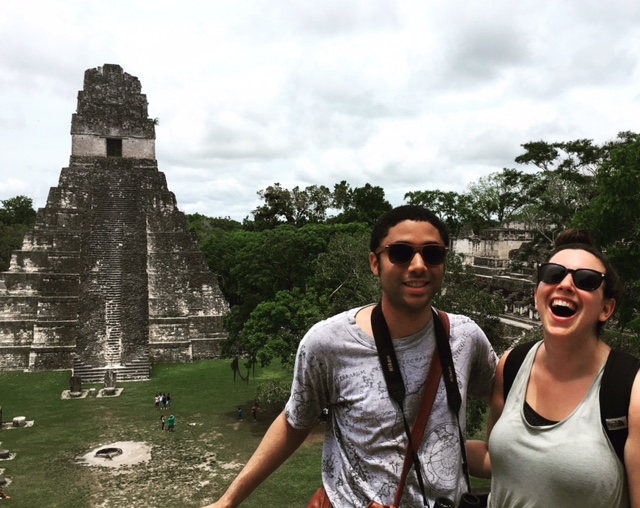
Advice for other partners in a relationship with a survivor with PTSD:
Alisa: Now being in a sexual relationship with me for 3+ years what would you tell younger Charlie about what to expect in being in a relationship with me during my healing process?
Charlie: I would tell younger Charlie two things:
- These reactions are not about you, it is about your partner. In many instances, triggering moments are not your fault; they are simply random cues that have a visceral impact on the survivor that are, at times, devoid of logic or sense. It is a physical reaction that sets one’s mind off on a path where they relive a horrible moment. Support her when this happens, and if there are reasonable ways to change a habit or action, work towards doing so.
- Be patient. Sometimes you’ll have to full-on stop sex at its craziest point or when you’re close to finishing. It will happen. It may be a bit painful (blue balls do suck) and it may mean a break from sex for an unknown period of time. But be patient because your support and understanding will mean the world to them. It will help your partner heal and get back to a place where she will feel comfortable with you again. And boy, will you enjoy it when it does.

Alisa: I have a lot of readers who are struggling to navigate their healing process with their partners. What advice would you give to someone supporting their partner through healing?
Charlie: While all relationships require give and take and compromise from both individuals, a relationship with a survivor will inevitably always feel like more of a give. And this is obviously not to add guilt on to the survivor, and this is not something to scare off others, but it is a pure fact of the situation that they will require effort and understanding that society and their friends and family may have not provided throughout their lives.
The most important piece of advice is to listen and be there for them when they need it. This is not about you, but it is about their struggles and being by their side not only because you want the best for them, but because they deserve the best for themselves. Know that they are dealing with a situation that they cannot help and may often leave them feeling powerless at times. It is at these moments that your love and support can provide the comfort and reassurance they need to ground themselves and move through the pain.
Alisa: What has been the scariest parts for you and how do you deal with that? Do you ever just want to press the EJECT button?
Charlie: The scariest moments are when I have to watch you sink into your grief and when I can see that you are doubting your strength as an individual. The scariest part is seeing your partner feel helpless. After Donald Trump’s “grab them by the pussy” video surfaced, it took weeks for you to get back to normal. I had to watch you lay in bed, unable to face the world, unable to smile. You walked around with a blank expression, free of the bubbly fun-loving energy I have come to know and love.

However, I know that when you feel this way, it is a passing moment, a burst of dark energy born of trauma that you can’t help. But that is all that it is: a moment. All that a life is is a series of moments, and the bright, happy and positive moments are so much greater and frequent and outshine the dark ones. I know that what you may feel like during the dark times is not who you are. You are strong, you are intelligent, you are beautiful and you persevere. THAT is who you are, and anything less than that is a fleeting moment. So no, I don’t press eject because you always have been, are, and will continue to be the person that I fell in love with.
Alisa: Final question: Why are you so goddamn AMAZING?
Charlie: Because I was raised to respect and accept good people regardless of their backgrounds. I was raised to be in touch with my emotions. We need more empathy and understanding in this world.
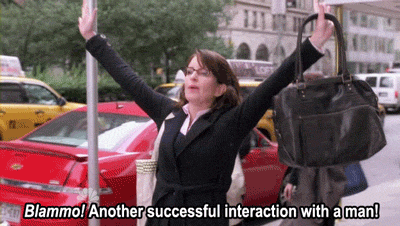
Want me to come speak at your event or facilitate a workshop?
I travel around the country giving talks, facilitate workshops and engaging on panels on the topics of healing from sexual trauma and supporting survivors. I promise, it’s more fun than you’d think. I’d love to speak at your event! Just shoot me an email through my contact page and we can talk about working together.

